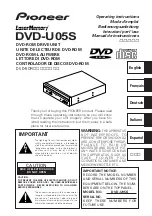
5.5 One-parameter Tuning (Fn203)
5-49
5
Adjustments
Functions To Suppress Vibration
• <Notch Filter/Anti-resonance Control Adjustment Auto Setting Function>
For vibration frequencies above 1,000 Hz when servo gains are increased, the notch filter auto setting function
provides effective suppression. For vibration frequencies between 100 and 1,000 Hz, the anti-resonance con-
trol adjustment auto setting function is effective.
• Auto Setting
To use auto setting, enable the notch filter/anti-resonance control adjustment auto setting function by using
parameters.
During tuning, the notch filter frequency (anti-resonance control frequency for the anti-resonance control
adjustment auto setting function) effective for the detected vibration is automatically set and displayed in
1
step
or
2 step
(in
Anti-res Adj
when using the anti-resonance control adjustment auto setting function).
Window with Notch Filter Automatically Set
• Cancel
If the automatically set notch filter frequency (or anti-resonance control frequency) does not effectively
suppress vibration, click
Cancel
to reset to the preceding frequency.
When the frequency is reset, vibration detection will restart.
• Vib Detect (vibration detection)
While the notch filter/anti-resonance control adjustment auto setting function is enabled, click
Vib
Detect
(vibration detection) to manually detect vibration. The SERVOPACK detects vibration at the
moment
Vib Detect
(vibration detection) is clicked, and the notch filter frequency (or anti-resonance
control frequency) effective for the detected vibration is set and displayed in
1 step
or
2 step
(or in
Anti-res Adj
). Manual vibration detection can also be executed when the SERVOPACK does not detect
vibration.
• Anti-res Ctrl Adj (anti-resonance control)
Click
Anti-res Ctrl Adj
(anti-resonance control) to execute the anti-resonance control function if fur-
ther adjustment is required. See
5.6 Anti-Resonance Control Adjustment Function (Fn204)
for details.
• <Autotuning with Reference Input>
To Autotuning
Click
To Autotuning
to execute autotuning using reference inputs from the host controller. Refer to
5.4
Advanced Autotuning by Reference (Fn202)
for details.
MECHA
















































